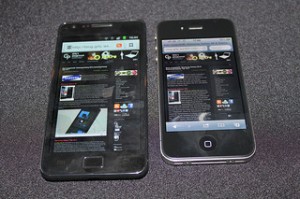Apple vs Samsung: Who Owns the Rectangle?
This week in San Jose, a trial opened that may be the World War III of patents. Apple is suing Samsung, alleging that the Korean tech giant has knocked off many features of its iPhone and iPad. Apple wants $2.5 billion in damages – a record in a patent case — and a court order forbidding Samsung from selling some of its most popular phones and tablets in the United States. Samsung claims that Apple is the one stealing, and that some of Apple’s patents are invalid because they are so commonplace.
With respect to at least one of Apple’s patents, Samsung has a point. A patent at the heart of the dispute. Design Patent 504,889 — which lists Steve Jobs and Apple design guru Jonathan Ive, among others, as the “inventors” — is a claim for a rectangular electronic device with rounded corners. That’s right, Apple is claiming control over rectangles. The full claim is only 2 lines long, and amazingly broad – Apple is claiming all devices with the basic shape shown here.
The original reading technology—paper—is rectangular, and it’s no surprise that computer screens have long used the same shape. Apple isn’t the first firm to think of a rectangular-shaped device–in fact, both Samsung and Apple may have been working off of earlier rectangular designs from Sony. But even if Apple got to the rectangle first, wouldn’t the idea be obvious? (Books are rectangular; so are flat-panel TVs, laptop screens, the Kindle, and we’re pretty sure the dusty French digital pioneer, Minitel).
Still, the Patent and Trademark Office gave Apple a rectangle patent, which illustrates an important point about our IP system: it is pretty easy to get an absurd patent awarded. Actually defending it in court, as Apple now has to do, is of course more complicated.
Understanding this patent brawl is important because it’s just the tip of the iceberg. Apple and Samsung are battling in courtrooms in Britain and Germany, and an all-star lineup of tech companies are locked in dozens of similar suits across the globe. And if Apple wins, Samsung isn’t the only (or even the principal) casualty. Many of Apple’s patent claims, should they prevail, could be pressed against all smartphones that (like Samsung’s) run Google’s Android. It’s tempting to view this litigation as a stalking horse for the broader Apple vs. Google showdown – which, at the moment, Android is winning. Indeed, phones like Samsung’s new Galaxy III S, which are thinner and sport bigger screens than the iPhone, are making the iPhone look outdated. Is it a coincidence that at the moment that Apple appears to be losing its market edge it turns to the courtroom?
We know one thing for sure: all of this litigation is great news for the law firms involved. Win or lose, they’ll make tens and possibly hundreds of millions in legal fees. Whether the smartphone litigation explosion is good news for the rest of us, however, is far from clear. We have patents to encourage innovators to invent nifty new features for devices like smartphones. But when is a feature too basic to deny others the right to knock it off? Could Apple, or someone else, patent a buttonless phone? An all-black phone? A phone with a “swipe-to-unlock” feature? (Actually, Apple has patented that . . . .).
The smartphone wars highlight a question of surpassing current importance: what’s the right tradeoff between patents and competition? The courts hearing these patent cases are going to play a huge – perhaps outsized – role in determining those questions for hundreds of millions of consumers who carry smartphones and tablets. And the amount of money at stake is simply astronomical. Is the patent system up to the task?


Comments